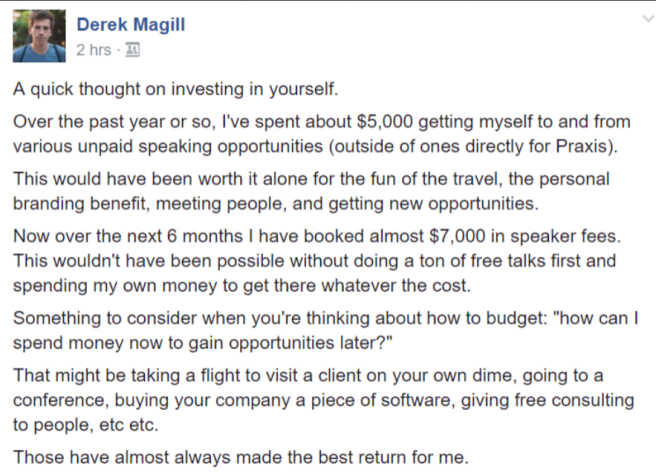Some people say “never work for free.” I agree as long as you don’t limit your concept of “pay” to a monetary fee.
Some of the best-paid gigs I’ve received are ones that came from the connections, publicity, and experience that I gained from doing so-called “wageless work.”
Here’s something my colleague from Praxis, Derek Magill, shared on social media earlier today:

It’s important to value yourself, but it’s equally important to not be too defensive or short-sighted when it comes to opportunities that aren’t accompanied by a nice paycheck.
Sometimes “getting paid” can mean building trust and loyalty with a client who will hire you for a lifetime. Sometimes “getting paid” can mean getting in front of a crowd filled with hundreds of people who will beg to pay you to do the same work for them. Sometimes “getting paid” can mean accumulating cool experiences that will make your competitors look and sound boring in comparison with you.
Sometimes “getting paid” can mean procuring the opportunity to temporarily work with highly respected professionals that will share highly guarded secrets of the trade with you. Sometimes “getting paid” can mean having the luxury of honing your skills in an environment where the expectations are low in order to prepare you to deliver massive value to the high-paying clients you’ll be serving down the road.
There are no limits to what it can mean to “get paid” if you strive to look at every project you work on with an opportunistic mindset. If you do free work because you’re uninformed about your right to charge for your services or because you think it’s selfish to make a profit, that’s a problem. But if you use free work as an investment in your future, then it can be a powerful and profitable tool.
While you are perfectly free to never work for free, it’s important to develop your ability to see all the non-obvious forms of value that other people constantly overlook. Instead of only focusing on immediate payouts, develop an abundant understanding of abundance. Because if your concept of wealth is poor, the same will be true of your ability to create it.



